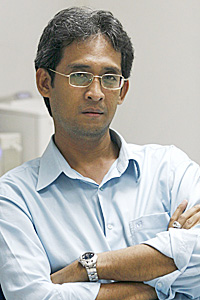
In the aftermath of the 1997 Asian financial crisis, a well-known businessman who went bankrupt as a result of the abrupt baht devaluation gave a blunt message to his creditors: "no money, no fleeing, and no paying".
This week a group of people in debt made a similar statement, though without justification. Surprisingly, they are teachers.
A video clip featuring a group of teachers gathered at Maha Sarakham Rajabhat University and declaring their intention to stop repaying their debts to the Government Savings Bank (GSB) went viral on Monday. The group, led by Ouaychai Wata, president of the Teachers' Organisation Network, said they would stop their repayments on Aug 1.
The group claims it represents some 450,000 teachers who took out loans amounting to more than 400 billion baht from the GSB. The loans were dished out under a collaborative project between the Education Ministry and the bank, initiated 14 years ago to resolve informal debts worth several billion baht racked up by teachers across the country.
They claim that the debt repayment structure and interest payments are unfair and the terms of repayment were not clearly mentioned in the loan agreements. They also claim teachers' indebtedness is not caused by their inability to service their debts alone, but also stems from the debt structure and interest rate calculation.
As a result, they are calling for a six-month suspension of their repayments followed by an interest rate cut to 1% -- the same rate the bank offers to farmers under a subsidy scheme.
The group also raised the issue with Tuang Inthachai, chairman of the education and sports committee under the National Legislative Assembly.
However, this is a group of people who are supposed to be setting a good example, teaching young people discipline and good manners. Their actions appear quite the contrary of this.
What they are doing is attempting to avoid repaying loans they have taken out.
The principle is: Anyone who borrows has a commitment to pay it back.
These teachers claim they should be "fairly treated" in the same way as farmers who benefit from subsidies. This is unacceptable.
Farmers get subsidies because they might suffer declining agricultural product prices or disasters that are beyond their control. But these teachers are indebted because they borrowed from loan sharks for their own purposes.
In addition, farmers do not have a fixed salary from the state, but teachers do.
The refinancing programme offered by the GSB to help teachers escape the clutches of loan sharks is one of the best offers the bank has ever given. Under the programme, teachers had their repayment period extended to 30 years at an interest rate of 5.5-6%. That is a very low rate considering that these loans have no collateral.
Other state officials do not receive this kind of financial support, not to mention the general public.
Moreover, the teachers should have known the terms of their loan deals before they agreed to them.
The problem is that teachers never stop borrowing. They may settle one debt after being supported by a state programme but they often take more loans from other sources and their debt accumulates. A number of refinancing programmes have been introduced to help teachers but the problem seems never-ending.
Tackling this problem is a major challenge.
I have no idea how and why teachers spend beyond their means. Have they no financial management plans? Or do they just want to get rich quickly by taking out loans for investments which go bad? Or are they addicted to gambling, or investing in shares and betting on illegal lotteries?
What I do know is that many teachers in Thailand spend a lot of money polishing their social status.
For example, if one teacher in a community buys a car, others will buy cars that are more expensive. This attitude also applies to other items.
Such debt problems are also likely to affect the quality of their teaching.
Some teachers have failed to meet their teaching time commitments as they have had to go and settle their debt problems while others have cancelled classes in a bid to avoid their creditors.
If teachers themselves do not understand the sufficiency economy theory, how can they teach it to their students?
Nevertheless, I hope the group of teachers who want to halt their debt repayments represent just a minority and that the majority of their profession do not agree with them.
If not, what hope is there for the future of our country's education system?
